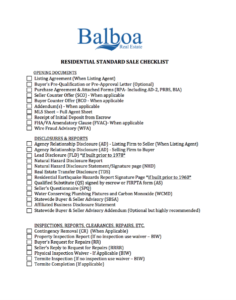What Real Estate Forms Are Required on a Transaction Checklist?
 Any reputable California real estate brokerage is going furnish their agents with a closing checklist with all the documents needed to complete the file. It’s important to note that what a brokerage requires and what is legally required are two different things. The California Association of Realtors makes additional forms that are designed to get the seller to disclosure more and reduce liability. Many brokerages add excessive forms to their transaction checklist because they don’t know any better. This creates redundant forms and unnecessary amount of paperwork. It’s our opinion at Balboa Real Estate that the broker should seek to cover the broadest spectrum for their clients while utilizing the least amount of forms. Basically, to create a transaction checklist that is extremely efficient.
Any reputable California real estate brokerage is going furnish their agents with a closing checklist with all the documents needed to complete the file. It’s important to note that what a brokerage requires and what is legally required are two different things. The California Association of Realtors makes additional forms that are designed to get the seller to disclosure more and reduce liability. Many brokerages add excessive forms to their transaction checklist because they don’t know any better. This creates redundant forms and unnecessary amount of paperwork. It’s our opinion at Balboa Real Estate that the broker should seek to cover the broadest spectrum for their clients while utilizing the least amount of forms. Basically, to create a transaction checklist that is extremely efficient.
So What Forms Should Be On A Transaction Checklist?
RESIDENTIAL STANDARD SALE CHECKLIST
OPENING DOCUMENTS
Listing Agreement (When Listing Agent)Buyer’s Pre-Qualification or Pre-Approval Letter (Optional)
Purchase Agreement & Attached Forms (RPA- Including AD-2, PRBS, BIA) Seller Counter Offer (SCO) – When applicable
Buyer Counter Offer (BCO – When applicable
Addendum(s) – When applicable
MLS Sheet – Full Agent Sheet
Receipt of Initial Deposit from Escrow
FHA/VA Amendatory Clause (FVAC)- When applicable
Wire Fraud Advisory (WFA)
DISCLOSURES & REPORTS
Agency Relationship Disclosure (AD) – Listing Firm to Seller (When Listing Agent) Agency Relationship Disclosure (AD) – Selling Firm to Buyer
Lead Disclosure (FLD) *if built prior to 1978*
Natural Hazard Disclosure Report
Natural Hazard Disclosure Statement/Signature page (NHD)
Real Estate Transfer Disclosure (TDS)
Residential Earthquake Hazards Report Signature Page *if built prior to 1960* Qualified Substitute (QS) signed by escrow or FIRPTA form (AS)
Seller’s Questionnaire (SPQ)
Agent Visual Inspection Disclosure OR Agent Inspection Noted on Page 3 of TDS.
Water Conserving Plumbing Fixtures and Carbon Monoxide (WCMD)
Statewide Buyer & Seller Advisory (SBSA)
Affiliated Business Disclosure Statement
Statewide Buyer & Seller Advisory Addendum (Optional but highly recommended)
INSPECTIONS, REPORTS, CLEARANCES, REPAIRS, ETC.
Contingency Removal (CR) (When Applicable)
Property Inspection Report (If no inspection use waiver – BIW) Buyer’s Request for Repairs (RR)
Seller’s Reply to Request for Repairs (RRRR)
Physical Inspection Waiver – If Applicable (BIW)
Termite Inspection (If no inspection use waiver – BIW) Termite Completion (If applicable)
TITLE & ESCROW
Escrow Instructions (Unsigned OK)
Preliminary Title Report
Home Warranty Plan Confirmation (When applicable)
CLOSING DOCUMENTS, TASKS TO COMPLETE
Closing Statement
Verification of Property Condition (VP) AKA Final Walk Through
Copy of Commission Check
Local Disclosures (When Applicable)
Any Additional Documents Used in Transaction
If you have questions or comments then please contact info@balboateam.com








